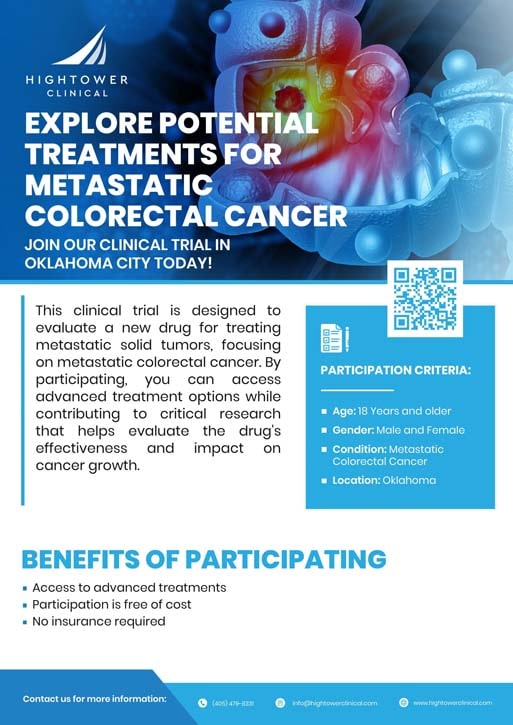Metastatic colorectal cancer (mCRC) occurs when cancer that starts in the colon or rectum spreads to other parts of the body, such as the liver, lungs, or distant lymph nodes, making it harder to treat.
Metastatic Colorectal Cancer Clinical Trials in Oklahoma City, OK
Advancing treatment options through innovative metastatic colorectal cancer clinical trials in Oklahoma City, OK, designed to bring new hope to patients.
Enroll Now
Diagnosed with Metastatic Colorectal Cancer?
You might qualify for our metastatic colorectal clinical trials.
This clinical trial is focused on testing a new drug for patients with metastatic solid tumors. The goal is to determine how effective the drug is in treating cancers through studying metastatic colorectal cancer clinical trial in Oklahoma City, OK. Patients participating in this study will help researchers evaluate how well the drug works and how the body reacts to it.
Additionally, this metastatic colorectal cancer clinical trial in Oklahoma City, OK offers participants access to cutting-edge treatment while contributing to important research. The study will also monitor the drug’s side effects and overall impact on cancer growth.
So, join us in advancing cancer treatment through active participation in our trial.
* Participation is free of charge and completely voluntary.
* To get started, fill out the form, and our research team will reach out to evaluate your eligibility for the study.
Colorectal Cancer
| Study Name | Protocol Number | Sponsor |
|---|---|---|
| Metastatic Colorectal Cancer | Merus N.V. |
About Metastatic Colorectal Cancer Clinical Trials
Metastatic colorectal cancer occurs when cancer spreads from the colon or rectum to other parts of the body, making treatment more challenging. At Hightower, our metastatic colorectal cancer clinical trials are focused on developing innovative and advanced treatment options.
Furthermore, these trials aim to explore new therapies that have the potential to improve outcomes for patients with metastatic solid tumors and offer hope to them. Our team of experienced specialists is dedicated to providing top-tier care, ensuring patient access to the latest advancements.
* All study-related procedures and treatments are offered free of charge, with no insurance required.
* The study doctor will explain every detail of the clinical trial and answer all your questions before you decide whether to participate.
What to Expect?
Once you agree to participate, you’ll be asked to sign an Informed Consent Form, which provides all the details about the study. Our research team will guide you through the process, clearly explaining your role and addressing any questions before you make your decision to participate or withdraw.
Furthermore, after signing the consent form, you’ll be randomly assigned to either the Control group, which receives a placebo, or the Experimental group, which receives the actual study medication. In this double-blind study, neither you nor the researchers will know which treatment you’re receiving.
* All study-related care is completely free, with experienced physicians conducting comprehensive exams and assessments throughout the process. *


Age
18 Years and older
Gender
Male & Female
Condition
Metastatic Colorectal Cancer
Current Status
Recruiting
Metastatic Colorectal Cancer—Explained
When colorectal cancer metastasizes, it spreads beyond the colon or rectum to other organs, making treatment more complex and critical.
Common Symptoms
- Unexplained Weight Loss
- Blood in Stool
- Loss of Appetite
- Abdominal Pain or Cramping
- Changes in Bowel Habits
Potential Complications
- Liver Metastasis
- Bowel Obstruction
- Severe Anemia
- Organ Failure
- Ascites
Frequently Asked Questions
What are the symptoms of metastatic colorectal cancer?
Common symptoms include persistent abdominal pain, changes in bowel habits, unexplained weight loss, fatigue, blood in stool, and loss of appetite.
How is metastatic colorectal cancer diagnosed?
Diagnosis typically involves a combination of imaging tests (CT, MRI, PET scans), blood tests (to check for tumor markers), colonoscopy, and sometimes biopsy to determine the extent of cancer spread.
Can metastatic colorectal cancer be cured?
While mCRC is challenging to cure, treatment options like surgery, chemotherapy, radiation, and targeted therapies can help manage the disease.
What happens during metastatic colorectal cancer clinical trials?
Clinical trials for mCRC test new treatments and therapies. Participants may receive investigational drugs or standard treatments in a controlled setting, with progress carefully monitored by researchers.
Why participate in metastatic colorectal cancer clinical trials in Oklahoma City, OK?
Participating in mCRC clinical trials offers access to cutting-edge treatments that may not yet be widely available to the masses. Trials also contribute to advancing cancer research, helping future patients.




